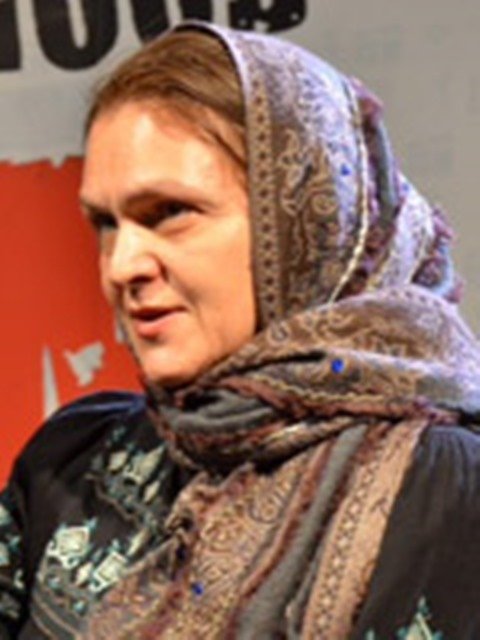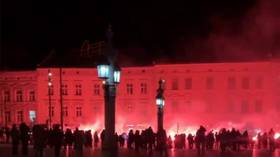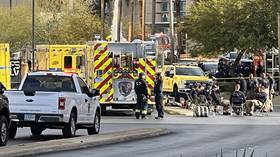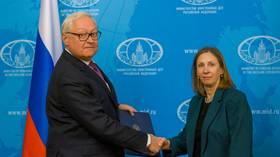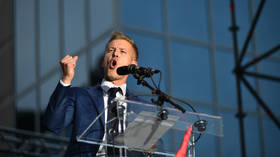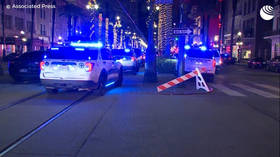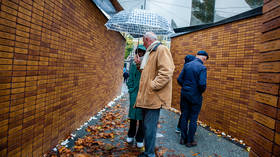Patriarch of Georgia: Our church and people never cut ties with Russia
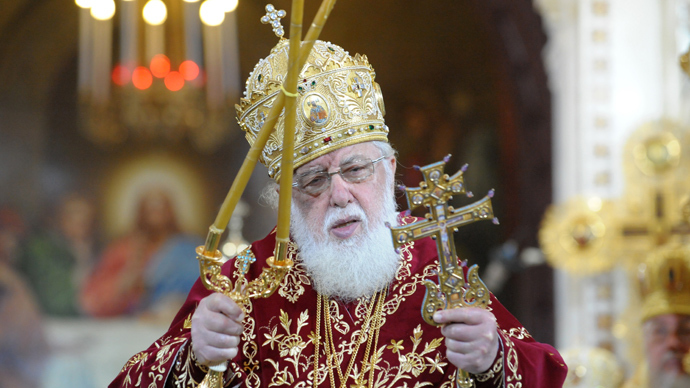
Despite the South Ossetian war of 2008, close religious and human ties remain between Georgia and Russia, Patriarch of Georgia Ilia II told RT. He expressed hope that politicians in the two Orthodox states will “find a way out of the dead end.”
On Tuesday, the most influential figure in Georgia’s religious,
political, and public life is arriving in Moscow to celebrate the
1025th anniversary of the Christianization of Russia.
Catholicos-Patriarch Ilia II is the only official in Georgia who
has kept his ties with Russia. After the August 2008 War, Russia
and Georgia severed diplomatic relations. So for the past five
years, Patriarch Ilia has been the only Georgian representative
to visit Russia. He has met with Patriarch of Moscow Kirill, and
even President Putin. Their first meeting took place at the
funeral of Patriarch Aleksy II, only four months after the war.
Patriarch Ilia’s influence in Georgia is unprecedented. Polls
conducted by US companies show that his approval rating has never
been lower than 92 per cent. Five years ago, the Patriarch
personally spoke to Russian military commanders, visiting the war
zone to bring out bodies of Georgian soldiers.
Ahead of his visit to the Russian capital, Patriarch Ilia spoke
to RT commentator Nadezhda Kevorkova.
Russian citizens do not need visas to go to Georgia, but
Georgians can only enter Russia if they have a letter of
invitation. Several days ago, the administrative border - set
unilaterally after the August 2008 war - was moved 300 meters
towards Georgia. A fence is currently being built on the site.
Russia and Georgia have different views on what happened five
years ago. Georgia says that Abkhazia and territories around
Tskhinval were occupied by Russia. But Russia’s position is that
the Georgian army, on Mikhail Saakashvili’s order, attacked South
Ossetia, and Russia had to defend the civilians, and then
recognize independence of the two republics. The Russian Orthodox
Church did not recognize the self-proclaimed independence of the
two church communities, staying true to the unity of Orthodox
Christians.

Ahead of his visit to Russia, Patriarch Ilia talked about close
ties between Russia and Georgia. Besides Orthodox Christianity,
they have shared culture, traditions, history, poets, and even
the most well-known Georgian and influential USSR leader Joseph
Stalin.
RT: Your Holiness, it’s been five years since the tragic
events. In what way would you probably admonish our nations and
what would you say? What would you tell those who have gone
through such a tragedy in the history of our Orthodox
nations?
Patriarch Ilia: First of all, I’d like to greet everybody
who will listen to or read this interview. I want to note that
tense relations between Georgia and Russia have been artificially
concocted. Despite all the difficulties between the two
countries, Georgian and Russian churches managed to preserve the
brotherhood, and so did our people – they preserved kind ties as
well.
We welcome Russian pilgrims with joy and they attend our prayers.
Our pilgrims, in their turn, visit Russian sanctuaries and holy
sites. It can’t last long – there are kind driving forces both in
Russia and in Georgia which will stabilize these uncertain
relationships and I believe that Abkhazia and Tskhinvali will
become part of Georgia again.
We have preserved these kind relationships with the Abkhaz and
Ossetian people, too. As you know, I was born in Vladikavkaz. I
graduated from high school there and I know the Ossetians quite
well. They are kind and gifted people. We were so close with them
that our family’s spiritual father was the Ossetian, Father
Mikhail Dzatsoev.
As for Abkhazia, I was a Metropolitan of Abkhazia for 11 years
and can’t recall a single misunderstanding between us.
I don’t think there are any barriers. In case we face a dead end,
we should find a way out of it.

RT:Your Holiness, at this point you are the only
person who is given the spiritual authority – literally the only
one who can communicate with Russia. Today you are one of the few
people who may travel from Georgia to Russia at all. The fact
that the Patriarch is the only one who can carry out negotiations
is unprecedented. How should we regard this? How should we take
this?
PI: The negotiations can be carried out by both clergy and
laity. There are no barriers. Moreover, we have a new government
that is open for talks. And I believe such talks will take place.
I am not the one carrying out the negotiations, let alone
political ones. I just always express my opinion, because you
can’t turn a blind eye to the complications that arose in the
relations between Russia and Georgia.
I think we have always been fraternal nations and will stay this
way – we just need to be frank with each other and shouldn’t do
things that irritate the other side. For instance, the
administrative border has been recently moved 300 meters further
into Georgian-controlled territory. For Russia it means nothing
but for Georgia, it is a lot - and it hurts.
RT:How should we talk to about it?
PI: In Georgia?
RT:No, in Russia. We don’t understand who is in charge
of it here in Russia.
PI: The president is. And in Georgia it’s the scope of
competence of our new prime minister. They must negotiate, meet,
and discuss ways to solve these issues.
Georgia cannot be divided. Our Lady will not allow this to
happen. This would be a large sin. Abkhazia and Tskhinvali are
territories which were originally part of Georgia.
That’s why I think that Russians and Georgians as Christians will
definitely find a way out of this complicated situation.
I love Russia. I got my education there at the Clerical Seminary
and the Clerical Academy in the town of Zagorsk (now called
Sergiev Posad – translator’s remark) in the Holy Trinity
Monastery of St. Sergius.
I revere St. Sergius as my spiritual father and always pray to
him. And when we had this wall painted, we put St. Sergius and
Saint Seraphim of Sarov among Georgian saints, here in the second
row.
Yesterday we marked one of the remembrance days related with St.
Sergius and I sent a wire with congratulations to Patriarch
Kirill.
RT:Is there anything else that unites our two
nations?
PI: We are united by everything that’s around us – not
just religion, not just Orthodox Christianity and our culture.
Georgians love Russian culture. Georgians love Russian literature
and philosophy, especially the works of Pavel Florensky,
Berdyaev, and others. When I was a student at the Seminary and
the academy in the Soviet times, these books were banned by the
authorities, but we still found a way to read them.

RT:Today marks the anniversary of famous Soviet poet
Vladimir Mayakovsky’s birthday…
PI: Mayakovsky was born in Georgia. I read some of his
works but he is a poet I don’t really understand. I’ll quote you
a line: “A Bolshevik in tears? Should a museum put him on
display? What a house he’d draw…” This is well-phrased but
the meaning escapes from me.
RT: While we are talking about
significant actors of the 20th century I’d really like to ask you
about Stalin. You should’ve noticed that the further we get from
Stalin’s era in Russia, the more he becomes a personification of
the proper, if not fair, statehood. In Georgia, people tell me
that they don’t even consider him truly Georgian because he got
so “Russified.”
PI: No, he was both Georgian and Russian at the same time.
He was of Georgian origin and he spoke fluent Georgian. He knew
Georgian folk songs as well as chants. When he died, I was
studying at the Seminary. We all gathered at the assembly hall
and cried at his burial ceremony.
Our Chancellor, Father Konstantin Ruzhitsky, told us a lot about
Stalin’s personality. He learned it from Patriarch Aleksy I
(Simansky). Aleksy I, Patriarch of Moscow and all Russia, was an
exceptional individual. He was a man of great culture and
spirituality. He truly respected and loved Stalin.
One day, Stalin had a reception for Patriarch Alexy I, Patriarch
Sergy, Metropolitan Nicholas (Yarushevich), and High Priest
Nicholas Kolchitsky. So he asked them, ‘What is it that you
need?,” and they replied that they were grateful that he gave
permission to open churches. He responded, “No, that’s not
enough. Go ahead and open Seminaries and clerical schools.’ He
had studied at the Seminary too, so he knew the value of
religious education.”
Stalin was an outstanding person. Such people are quite rare. He
understood the worldwide significance of Russia.
RT:What did Stalin do for Georgia? Some people told me
that he never took care of Georgia and that he should have done
more for this country. However, I do know that some churches were
opened in his time.
PI: He just treated all the Republics equally. He didn’t
single out Georgia in any special way. In World War II, however,
the largest share of victims was among Georgians. I think he was
a believer, especially in the end.
RT:What would be your closing message for our
audience?
PI: We are living in a very complicated time of
globalization. Russia and Georgia have accumulated a lot of
spiritual values over centuries. So we have to ensure we don’t
lose these values, i.e. our faith, our homeland, and our culture.
I wish peace, prosperity and well-being to all peoples of Russia,
and to our [Georgian] people as well. And I wish that the
complicated Russia-Georgia relations would improve and never
decline again.
I am planning now to visit Moscow, and then Kiev, and Minsk. The
Russian Orthodox Church and the entire Orthodox world are
celebrating the 1025th anniversary of the Christianization of
Russia, and we will be participating in these festivities.
The statements, views and opinions expressed in this column are solely those of the author and do not necessarily represent those of RT.
